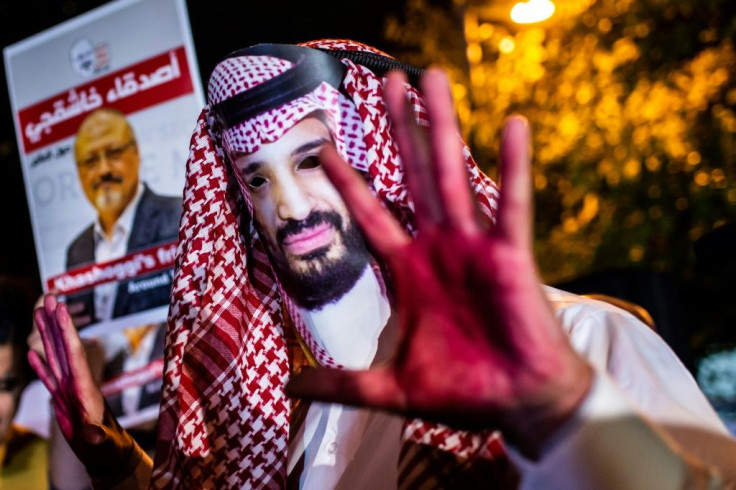Justice Eludes Slain Saudi Critic As Crackdown Persists

Global outrage over Saudi journalist Jamal Khashoggi's murder has dissipated a year after the killing, but justice remains elusive with opaque trial proceedings and the government cracking down on dissent.
Seeking to draw a line under one of its worst diplomatic crises, Saudi Arabia has put 11 unidentified suspects on trial for the murder in its Istanbul consulate last October, with five of them facing the death penalty.
But the murder is said to have involved a 15-man team of Saudi agents, and both the CIA and a UN special envoy have directly linked de facto ruler Crown Prince Mohammed bin Salman to the killing, a charge the kingdom denies.
Conspicuously absent from the closed-door trial that began in January is Saud al-Qahtani, the royal court's media czar and a close confidant of the prince, who was sacked over his suspected role in the affair.
In the latest court session in July, one of Khashoggi's relatives challenged Qahtani's absence and demanded that he be summoned to testify, two Western officials privy to the information told AFP.
It was unclear what prompted the appeal or whether the Saudi court will accept it.
But the request to bring in Qahtani –- who gained influence during Prince Mohammed's mercurial rise to power -- marks a stunning development in a trial thought to be tightly controlled by the state, one of the officials said.
Qahtani has long elicited fear in the kingdom, earning nicknames such as "troll master", "Mr Hashtag" and "lord of the flies" for managing an electronic army to defend the crown prince's image and intimidate his perceived critics.
Qahtani has not appeared in public since the murder and his whereabouts are unknown, sparking speculation over whether the kingdom is protecting him or keen to discipline him separately.
'Attempt to scapegoat'
Officials from the US, which has imposed sanctions on Qahtani for his part in the "planning and execution" of the operation that led to the murder, are known to have urged the crown prince to sever ties with him.
But a rupture may be complicated by the fact he is thought to be privy to sensitive state secrets.
"The removal and subsequent low profile of Saud al-Qahtani... can be seen not as a genuine step at reform, but as an attempt to scapegoat a high level official in order to give the impression Saudi is changing," Marc Owen Jones, a research fellow at Britain's Exeter University, told AFP.
It remains unclear when the trial will conclude. The Saudi media ministry did not respond to requests for comment.
Diplomats from the UN Security Council's permanent members –- Britain, China, France, Russia and the US –- as well as Turkey are allowed to attend as observers of the Saudi legal proceedings that are held entirely in Arabic.
They are not allowed to bring interpreters and are usually summoned at short notice, Western sources say.
Khashoggi's family, who are permitted to attend the trial, have rejected reports of a settlement with the Saudi government.
His son said on Twitter Tuesday that he has "full confidence" in the kingdom's judicial system and criticised "enemies in the East and West" who he said were exploiting the case to undermine the country and its leadership.
'No space for criticism'
Speaking to CBS's 60 Minutes ahead of the anniversary, Prince Mohammed denied ordering Khashoggi's killing, but said he "took full responsibility as a leader in Saudi Arabia".
Agnes Callamard, the UN special rapporteur on extrajudicial killings whose independent probe found "credible evidence" linking him to the murder and attempted cover-up, dismissed that defence.
"He is only taking corporate responsibility for the crime, which goes without saying," she told AFP.
Meanwhile, numerous critics of the crown prince remain imprisoned or are on trial.
Saudi authorities recently offered to release jailed activist Loujain al-Hathloul in exchange for her video testimony denying she had been tortured and sexually harassed in prison, according to her family.
Hathloul, among nearly a dozen women activists arrested just weeks before the kingdom lifted the ban on female motorists last year, has accused interrogators of subjecting them to electric shocks, flogging and groping.
The government vigorously denies the charge.
Since the murder, the Saudi king has sought to elevate the experienced old guard, widely seen to be sidelined by the young crown prince, to temper what critics describe as his rash policy decisions.
"There have been arrests of other intellectuals and activists and certainly no space for criticism of the leadership has been opened," said Kristin Diwan, from the Arab Gulf States Institute in Washington.
"The overall direction of policy is unchanged."
© Copyright AFP 2024. All rights reserved.







